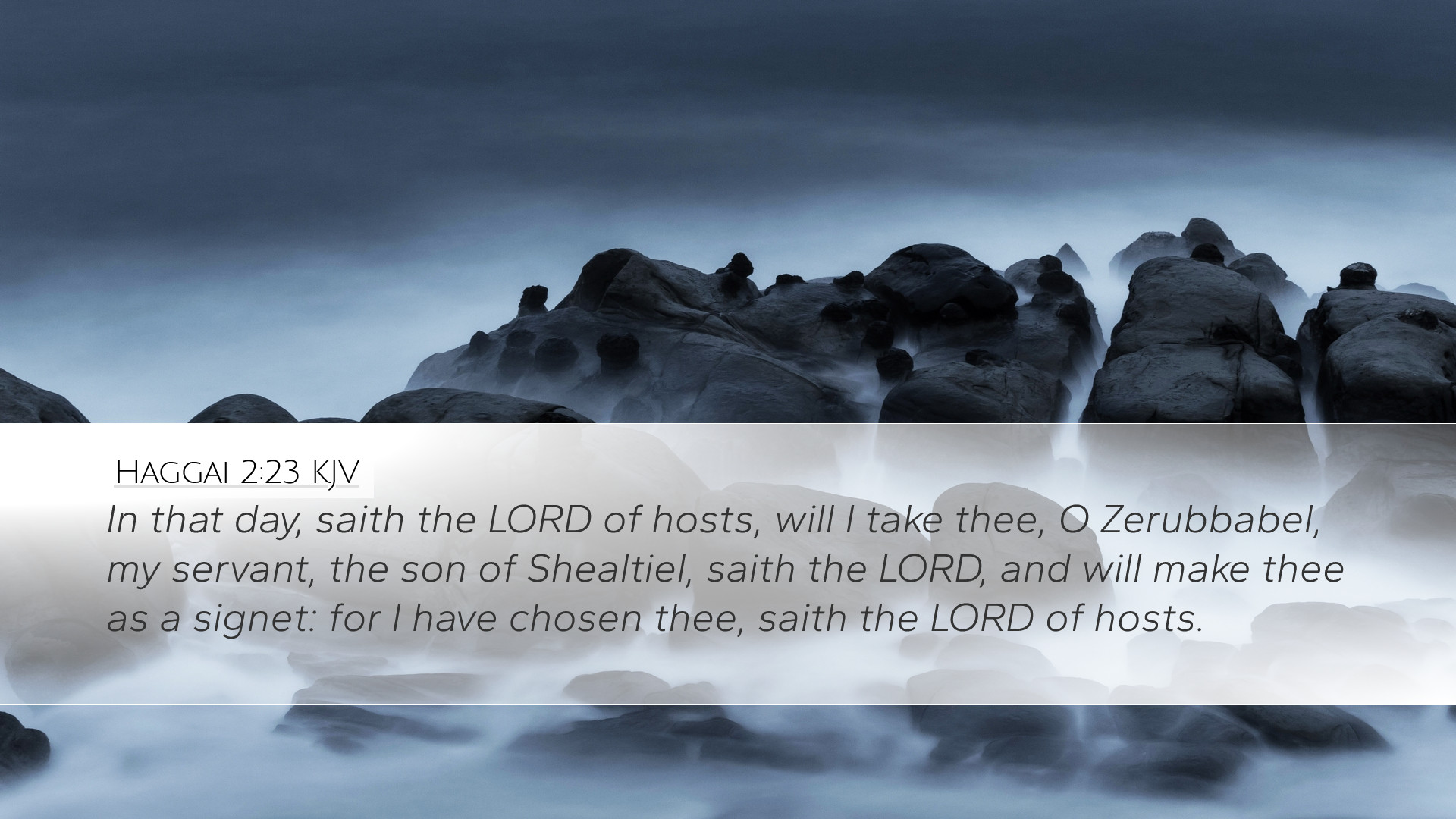Old Testament
Genesis Exodus Leviticus Numbers Deuteronomy Joshua Judges Ruth 1 Samuel 2 Samuel 1 Kings 2 Kings 1 Chronicles 2 Chronicles Ezra Nehemiah Esther Job Psalms Proverbs Ecclesiastes Song of Solomon Isaiah Jeremiah Lamentations Ezekiel Daniel Hosea Joel Amos Obadiah Jonah Micah Nahum Habakkuk Zephaniah Haggai Zechariah MalachiHaggai 2:23
Haggai 2:23 KJV
In that day, saith the LORD of hosts, will I take thee, O Zerubbabel, my servant, the son of Shealtiel, saith the LORD, and will make thee as a signet: for I have chosen thee, saith the LORD of hosts.
Haggai 2:23 Bible Commentary
Commentary on Haggai 2:23
Bible Verse: Haggai 2:23 (ESV) - "On that day, declares the Lord of hosts, I will take you, O Zerubbabel my servant, the son of Shealtiel, declares the Lord, and make you like a signet ring, for I have chosen you, declares the Lord of hosts."
Introduction
The verse from Haggai 2:23 stands as a powerful declaration from God to Zerubbabel, symbolizing the restoration of God’s presence among His people and highlighting the significance of leadership in the covenant community. This commentary seeks to explore the depth of this verse through the insights of renowned commentators such as Matthew Henry, Albert Barnes, and Adam Clarke.
God's Declaration and Chosen Servant
Contextual Overview
The book of Haggai is set during the period after the Babylonian exile when the Israelites were returning to Jerusalem to rebuild the temple. Zerubbabel, the governor of Judah and a descendant of David, plays a pivotal role in this restoration. This verse occurs at a critical time when the people were discouraged due to the hardships faced in their rebuilding efforts.
Matthew Henry's Insight
Matthew Henry highlights that God's declaration “On that day” serves to signify a future moment when God's favor will be distinctly manifested. This divine promise is not merely about Zerubbabel's leadership but represents God’s restoration of His people and His house. Henry notes the significance of Zerubbabel being likened to a signet ring, pointing to the authority and authenticity bestowed upon him as God’s chosen servant.
Albert Barnes’s Observations
Barnes emphasizes the personal nature of God's relationship with Zerubbabel, describing him as “My servant”. This title denotes a close bond, establishing Zerubbabel not only as a leader but as a servant of the Lord, carrying out His will. Barnes elucidates that the signet ring symbolizes seal and ownership, suggesting that Zerubbabel would seal God’s purposes in Israel through his leadership.
Adam Clarke's Analysis
Adam Clarke notes the significance of the phrase “I have chosen you.” Clarke points out that this indicates God’s sovereign choice, which is not dependent on the merit of the individual but on God’s grace and purpose. This assertion reassures the people of Israel that God is still in control and continues to work through His chosen leaders.
The Significance of the Signet Ring
The Symbol of Authority
The metaphor of the signet ring is profound, signifying authority and authenticity. Henry elaborates that the signet ring was a token of royal authority, often used to seal documents and signify ownership. By calling Zerubbabel a signet ring, God affirms Zerubbabel’s significant role in the governance of His people, establishing him as a mediator between the divine and the earthly realms.
Theological Implications
The role of Zerubbabel as a signet ring anticipates the eventual coming of the Messiah, who would fulfill the ultimate covenant promises. As Clarke points out, this has messianic implications, indicating that Zerubbabel serves as a type of Christ, whose work would culminate in the New Covenant. This theological connection reinforces the importance of continuity in God's redemptive history.
Application for Today
Encouragement for Leaders
For modern pastors and church leaders, Haggai 2:23 offers profound encouragement. Just as Zerubbabel was chosen and empowered by God, so too are today’s leaders called to recognize their identity in Christ and the authority granted to them through the Holy Spirit. This creates a call to stewardship and faithfulness in leadership, emphasizing that their service is ultimately unto God.
The Role of the Church
The church today stands in a similar relationship with God as did the Israelites in Haggai’s time. It is called to be a witness of God’s faithfulness and a participant in His redemptive work. The encouragement drawn from Zerubbabel’s example reinforces the hope that God is actively working through His church to build His kingdom. As Barnes notes, effective leadership aligns itself with God’s purposes, yielding fruitful outcomes.
Conclusion
In conclusion, Haggai 2:23 is a rich verse filled with divine promise and assurance. The insights from Henry, Barnes, and Clarke provide a multifaceted understanding of the text, highlighting themes of God’s choosing, authority, and the impact of leadership in fulfilling divine destiny. As we reflect on this scripture, may we be inspired to embrace our roles within the body of Christ, recognizing that we are chosen, called, and equipped to participate in His grand narrative of redemption.


